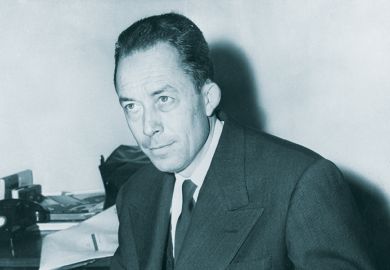Is there really a connection between our moral sense and religion? Philip Anderson weighs up the evidence for and against.
These two books present two scientists' contrasting views of God and religion. Francis Collins, author of The Language of God , has had more than his 15 minutes of fame as the successful director of the publicly funded half of the Human Genome Project; he presents us with a heartfelt memoir in which he evolves from an atheistic upbringing to belief. Richard Dawkins, author of The God Delusion , has followed up his well-known books on evolution - The Blind Watchmaker and The Selfish Gene - with a fiercely combative zinger against all forms of religion. It is roughly based on his TV series A World without Religion? (for which the introductory shot was Manhattan with the World Trade Centre's twin towers intact). Perhaps his usual readers will be delighted, but personally I found the intensity a bit extreme.
Does God exist? Already in the 13th century, Thomas Aquinas had conceived this to be a question, but it is only with the Enlightenment that it could begin to be asked in the terms it is now: as a questioning of the existence of the supernatural at all. Nonetheless, many discussions quote Aquinas's superficial "proofs" of the existence of God, and the books by Collins and Dawkins do the same.
But of course the question is, what do we mean by "God" and by "exist"? Surely in the religious context, Collins does not really mean "exist" in the scientific sense that he would apply to his genome data. The essence of scientific reality is reproducibility, that whenever you look at it, and whoever is doing the looking, the data on the genome is the same. I do not need to belabour the point that whatever the word "God" means existentially, reproducibility cannot be what Collins is advocating.
Many believers do, in fact, believe in that kind of literal existence for God, especially in the US, where something like a quarter of all Americans seem to believe in the End of Days scenario that will have us all participating, sooner rather than later, in an Armageddon that will sort out our destinations for all eternity. But there is nothing they can point to in the way of tangible verification that would convince, for instance, a Muslim that the Father and the Son and the Holy Ghost are somewhere in the heavens judging us and watching for that moment; nor, vice versa, can the Muslim convince us that He provides 72 virgins for every suicide bomber. It is because they seem to be substantiating beliefs of this kind that Dawkins, for one, so deplores the more respected, and especially the scientific, advocates for religion such as Collins.
For the first hundred or so pages, Collins seems to avoid the trap of committing himself to a particular choice of a tangible God, until suddenly he took me by surprise by turning out to be a literal believer in at least the New Testament Christian narrative. At the same time, he argues persuasively and eloquently for completely Darwinian evolution as, of course, the decipherer of the genome must. The genome, as Collins describes it, contains overwhelming evidence for design by chance. He would seem to believe that the Creator set the whole thing in motion 13 billion years ago, in such a way as to lead to the evolution of modern humans about 100,000 years ago, then pretty much stood by until 2,006 years ago, when he caused a sequence of miraculous events that culminated, more or less, in the accession of Jesus into that place commonly referred to as heaven. (The words heaven, hell, immortality and soul do not appear in his book - I would have liked to hear Collins's opinions on them - but in a tentative way he does declare in favour of selected miracles.) Actually, more correctly, He must have begun to act 100,000 years ago, when He started inserting souls with a "moral sense" into human beings, some time after conception. In other words, Collins has designed his own religion, and he is stuck with a dilemma - is he or one of the billions of other monotheists right? Or would the immense diversity of choice simply make the null hypothesis more likely?
But let me return to the meaning of the word "exist". No one would ever say that syndromes do not exist - characteristic responses of the human organism to various stimuli, benign or otherwise. But increasingly we learn that these responses differ from individual to individual; what we find is that they group themselves into recognisable classifications. There is, for example, the syndrome of bipolar disorder, but no one person's bipolar disorder is identical to anyone else's. Many of these syndromes are quite benign and nearly universal, such as empathy, and the imprinting that leads to familial or romantic love; and they are responsible for profound beauty and great art. Dawkins likens religion to the imaginary playmate syndrome common in lonely children, but that is too dismissive. The need for God and the accompanying myths and rituals exist as a phenomenon of great power in many, if not most, of us. Its strength is attested to by the fact that for many thousands of years no one ever conceived of living without it. Dawkins can hardly expect to make it go away.
There is a third meaning of "exist", which Collins rejects and describes as the "God of the Gaps": the explanation of the unexplained bits of creation.
If one does not understand some step in evolution, for instance, one says "there is organisation and therefore a deliberate designer" - intelligent design. But there are other instances. For example, a surprising number of intelligent people believe that existence implies creation implies a Creator - a syllogism I fail to follow, especially because I know as a physicist that the decision is arbitrary as to what is cause and what effect.
Collins places great emphasis on what he calls the "moral sense", the more-or-less common ground that he finds in the ethical systems of all cultures and that he finds in himself, too. He does not, fortunately, equate religion with morality (I am sure that many of his friends are atheists, and atheists are on the whole no less moral than believers, nor do they have any expectation of forgiveness for evil they may do), but he feels strongly that there can be no explanation for the moral sense except that it was instilled by God. To my mind, this is another case of the "God of the Gaps".
The evolutionary explanation of the nearly universal tendency to moral, co-operative behaviour has not yet been found, but that does not mean that there is none. It seems to me that the survival value of a moral code must be immense, as one can see if we contrast life expectancy in a failed state such as the Democratic Republic of Congo or Somalia, where the moral code is largely abandoned independently of the piety of the population, with that in Europe.
As Dawkins points out, it seems to anyone familiar with evolutionary biology that the religious syndrome must be a behavioural Darwinian adaptation. No other species has evolved so long under survival pressure predominantly of intraspecies competition between groups - that is, war. It may be no accident that many of the sacred texts of world religions are war stories: much of the Old Testament, the Bhagavad Gita, Homer (in effect the sacred text of Greek polytheism), much of the Koran. The religious narratives of the early American civilisations are ugly, bloody and warlike. To the tribe, the survival value of a strong religious narrative enforcing social cohesion and obedience to the elders, encouraging reproduction and unreasonable optimism, and modulating the fear of death, is obviously very high in the situation of continuous intertribal warfare. How it worked itself out evolutionarily is yet to be understood.
The Language of God is Collins's personal memoir. As such, it must offer adequate explication of his crowning achievement, the reading of the human genome - a fair swatch of the book is details about biology. Even this gains a lot of interest from his not-so-saintly views of his scientific competitor, Craig Venter. But more interesting to many will be the account of how he arrived at his particular version of faith, and how he tries to reconcile the enlightened scepticism that is science with its logical opposite, faith. This book is a natural for the bestseller lists, if not particularly for its literary merit.
Dawkins's book is, oddly, much more embittered and deeply emotional, although leavened by effervescent wit. Much more than his previous books, The God Delusion is a direct attack on religion in all its forms as the source of much of the violence and evil in the world, as well as a strong plea for more tolerance of atheism. He makes much of the fact that polls reveal that Americans would rather vote for a political candidate who is gay, or has a criminal record, than for an atheist. We atheists can argue, as he does, that with the modern revolution in attitudes toward homosexuals, we have become the only group that may not reveal itself in normal social discourse.
Dawkins's point against even the more peaceful religions is that unquestioning faith becomes accepted as a virtue and not a defect, and that it is unquestioning faith that powers the dangerous fanatics. He is not willing to accept, as many people do, the countervailing good in the form of works and of personal satisfaction as balancing, more or less, the strictures of puritanism and the evils of fanaticism. And one must sigh at his optimism. He may be right that religion has become a poor survival strategy, leading the world in the direction of nuclear and environmental doom, but I am afraid that if so, the bottom line is that the next dominant species on Earth will not be us.
So here we have the pros and the cons of religion, and I am not sure that either book told me much more about this perpetual dialogue than I had been ruminating over for many years. Both are lively and probably, at least for those interested in hearing choir-directed preachments, worth reading. One hopes there will also be readers who will brave the alternative choice for themselves.
Philip W. Anderson is emeritus professor of physics, Princeton University, New Jersey, US. He was awarded the National Medal of Science by the US Government and is a Nobel laureate.
The Language of God: A Scientist Presents Evidence for Belief
Author - Francis S. Collins
Publisher - Free Press
Pages - 294
Price - £17.99
ISBN - 0 7432 8639 1
Register to continue
Why register?
- Registration is free and only takes a moment
- Once registered, you can read 3 articles a month
- Sign up for our newsletter
Subscribe
Or subscribe for unlimited access to:
- Unlimited access to news, views, insights & reviews
- Digital editions
- Digital access to THE’s university and college rankings analysis
Already registered or a current subscriber? Login



